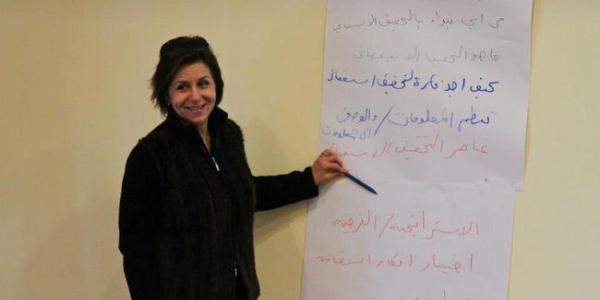By Ali al-Rawashdah
More than six years after its official inception in Amman, non-profit Arab Reporters for Investigative Journalism (ARIJ) continues to strive to spread a culture of investigative journalism across the Arab world, ARIJ executive director Rana Sabbagh told Al-Shorfa.
In February, independent evaluators funded by Danish development organisation DANIDA, which operates under the Danish foreign ministry, deemed the project a “success story”.
After conducting a five-month review of nine regional media projects conceived under the Danish-Arab Partnership Programme — which was launched a decade ago — they ranked ARIJ as the leading project in terms of relevance, efficiency, effectiveness, impact and sustainability.
The group trains and supports print, radio, television and on-line journalists in Jordan, Syria, Lebanon, Palestine, Egypt, Iraq, Bahrain, Yemen and Tunisia; seeks to promote high professional standards; and works to protect the rights of investigative journalists.
Sabbagh spoke with Al-Shorfa about the network’s work, challenges and strengths.
Al-Shorfa: Tell us about ARIJ’s success story.
Rana Sabbagh: The ARIJ network project grew out of the Danish-Arab Partnership Programme in 2004. The programme comprises five focal points, and one is media, where ARIJ falls; $120 million is allocated to this partnership programme.
Recently, the Danish foreign ministry’s external auditing office conducted a specialised evaluation of the partnership’s programmes to ascertain the effectiveness of the media focal point, which has cost more than $33 million. ARIJ earned the highest score in terms of efficiency, good governance and the level of return on investment since its inception in the Jordanian capital Amman in 2006.
During the evaluation period, which lasted about half a year, the network’s financial statements, documents and outputs were audited and its specialists and staff were interviewed. The evaluation concluded that ARIJ has been a success story since 2006, having benefited hundreds of Arab journalists in the art of investigative reporting.
Al-Shorfa: What are ARIJ’s objectives, and what has been accomplished since 2006?
Sabbagh: ARIJ’s first primary objective is to promote a culture of investigative journalism, which is rare in the corridors of editorial offices in Arab media institutions, media departments and Arab university faculties.
ARIJ has trained more than 700 Arab media professionals on the art of investigative reporting and its professional requirements, during which time it published more than 160 in-depth investigative reports on a multitude of topics.
Al-Shorfa: This success could not have been achieved without encountering difficulty, tell us about that.
Sabbagh: In publishing these documented, professional investigations, ARIJ was successful, not in that it uncovered abuses, corruption and the like, but rather in that it improved the quality of life for local communities, and this is a difficult task.
I’ll give you an example of an investigation a fellow investigative journalist conducted in Amman on bullying and assaults on the physically disabled in schools that was published last year. The success of the investigation lay not in that she uncovered the abuses, but in that [she helped] put an end to them and improved conditions for people with disabilities, as King Abdullah II intervened to end these abuses after the report was published last year.
ARIJ, like other Arab media institutions, faces problems, including restrictions on media freedom in regional countries, as well as the effects of the Arab Spring and regional unrest on the sustainability and continuity of systemised and professional investigative work.
Nonetheless, ARIJ has succeeded in expanding its network swiftly in nine Arab countries, including Jordan, Egypt, Bahrain, Lebanon, Syria, Iraq, Yemen, Tunisia, the West Bank and Gaza.
Al-Shorfa: On top of practical field work, to what extent have you influenced educational institutions?
Sabbagh: Some Arab universities are currently using ARIJ’s training manual in teaching investigative journalism courses, despite the shortcomings of most in teaching or devoting courses to investigative journalism.
The Institute of Press and Information Sciences (IPSI) at the University of Manouba in Tunisia, has utilised ARIJ’s investigative reporting work in the courses it offers, and other universities in Lebanon and Egypt are also considering teaching this media-specialised curriculum.
Al-Shorfa: How do you continue with your work with the current fast-changing social and cultural conditions in the region?
Sabbagh: There are great difficulties in our work environment, particularly for investigative journalists, who face daily problems and difficulties in obtaining information. I call on Arab officials to treat investigative journalists with high professionalism as there is a weakness and scarcity of information sources and it is hard to obtain information in most Arab countries.
On the other hand, Arab media professionals must steadfastly adhere to high professionalism and diligence in conducting in-depth investigations of all issues they encounter in their communities.
Despite the circumstances in the region, ARIJ has succeeded over the past 20 months in publishing an investigative report in Bahrain, two in Syria and one in Tunisia.
Al-Shorfa: What are the network’s prospects?
Sabbagh: ARIJ aspires to soon found a Society of Friends of Arab Investigative Journalism and to form a network of Arab ‘parliamentarians’ who support investigative journalism. ARIJ views the recent evaluation as a badge of high professionalism, pushing it to strengthen its work and reputation as a professional institution that is grounded in a strong tradition of media professionalism.
I appeal to ‘ARIJis’ (our Arab investigative journalist partners) to be attuned to needs of their communities, so they can advance the network through in-depth, continuous professional investigation.
http://al-shorfa.com/en_GB/articles/meii/features/2013/03/05/feature-03








